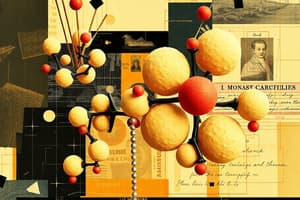Podcast
Questions and Answers
What are carbohydrates commonly known as?
What are carbohydrates commonly known as?
- Nucleic Acids
- Fats
- Proteins
- Sugars (correct)
What are the three categories of carbohydrates?
What are the three categories of carbohydrates?
Monosaccharides, Disaccharides, Polysaccharides
Disaccharides are formed by three molecules of monosaccharides.
Disaccharides are formed by three molecules of monosaccharides.
False (B)
Which of the following is a characteristic of monosaccharides?
Which of the following is a characteristic of monosaccharides?
The procedure for forming furfural is based on adding _____ to the sugar solution.
The procedure for forming furfural is based on adding _____ to the sugar solution.
What is the result of the Molisch test for the presence of carbohydrates?
What is the result of the Molisch test for the presence of carbohydrates?
Which reagent is used in the Molisch test?
Which reagent is used in the Molisch test?
Flashcards are hidden until you start studying
Study Notes
Carbohydrates
- Carbohydrates are polyhydroxy aldehydes, polyhydroxy ketones, or compounds that yield polyhydroxy aldehydes and polyhydroxy ketones upon hydrolysis.
- They are commonly known as sugars because most of them have a sweet taste.
- They serve as a major source of energy.
- They furnish the carbon chains of compound synthesis by living cells.
Classification of Carbohydrates
- Carbohydrates are classified as monosaccharides, disaccharides, and polysaccharides.
Monosaccharides
- They are highly soluble in water.
- They are less soluble in ethanol.
- They are insoluble in ether.
- They are either aldoses or ketoses.
- Free monosaccharides are all reducing sugars.
Disaccharides
- They are formed by two molecules of monosaccharides.
Polysaccharides
- They are classified as structural polysaccharides and storage polysaccharides.
- Structural polysaccharides: Cellulose
- Storage polysaccharides: Starch, Dextrin, Glycogen, Insulin
Test Based on the Formation of Furfural & its Derivatives
- The principle of this test is that hot H2SO4 will dehydrate sugars into furfural and its derivatives.
- Furfural / Hydroxymethylfurfural + phenolic compounds (𝛂-naphthol, orcinol, resorcinol) → colored condensation products.
- A positive reaction is indicated by the presence of color.
Molisch Test
- This test is used to detect the presence of carbohydrates.
- Procedure:
- Add 4 mL of solution to each tube and 2 drops of Molisch reagent.
- Incline the test tube and slowly add about 2 mL of concentrated H2SO4.
- Sulfuric acid is denser than water and will form a lower layer.
- Results:
- Distilled H2O: Presence of green ring
- 3% Glucose: Presence of purple ring
- 3% Lactose: Presence of purple ring
- 3% Starch: Presence of purple ring
- 3% Xylose: Presence of purple ring
Studying That Suits You
Use AI to generate personalized quizzes and flashcards to suit your learning preferences.




